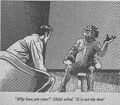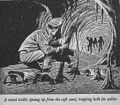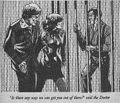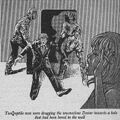Doctor Who and the Cave-Monsters (novelisation)
Doctor Who and the Cave-Monsters was the novelisation of Doctor Who and the Silurians. Interestingly enough, even though the serial it adapted was accidentally given a Target-style title, the novelisation didn't take the chance to carry the same title and instead gave it a completely different one. In a foreword for the 2011 reprint, Terrance Dicks said editor Richard Henwood changed titles to things he felt were more commercial.
Publisher's summary[[edit] | [edit source]]
1974 edition[[edit] | [edit source]]
All is not well at the Wenley Moor underground atomic research station: there are unaccountable losses of power-output; nervous breakdowns amongst the staff; and then – a death! UNIT is called in and the Brigadier is soon joined by DOCTOR WHO and Liz Shaw in a tense and exciting adventure with subterranean reptile men – SILURIANS – and a 40ft. high Tyrannosaurus rex, the biggest, most savage mammal which ever trod the earth!
"DOCTOR WHO, the children's own programme which adults adore ..." Gerard Garrett, The Daily Sketch
1992 edition[[edit] | [edit source]]
"If you really want to know what I think, the man simply died of fright..."
All is not well at the Wenley Moor underground atomic research station. Power is being unaccountably lost; the staff are on the verge of a strange nervous collapse and one man, his face horribly marked by some hideous claw, has been killed. The Silurians, ancient creatures who once ruled the Earth, are beginning to stir from their centuries-long slumber...
This is an adaptation by Malcolm Hulke of his own original screenplay, which featured Jon Pertwee in the role of the Doctor and which was originally published under the title The Cave Monsters.
2011 BBC Edition[[edit] | [edit source]]
"Okdel L'da looked across the valley to see the tip of the sun as it sank below the horizon. It was the last time he would see the sun for a hundred million years."
UNIT is called in to investigate security at a secret research centre buried under Wenley Moor. Unknown to the Doctor and his colleagues, the work at the Centre has woken a group of Silurians - intelligent reptiles that used to be the dominant life form on Earth during prehistoric times.
Now they have woken, the Silurians are appalled to find 'their' planet populated by upstart apes. The Doctor hopes to negotiate a peace deal, but there are those on both sides who cannot bear the thought of humans and Silurians living together. As UNIT soldiers enter the cave systems, and the Silurians unleash a deadly plague that could wipe out the human race, the battle for planet Earth begins.
This novel is based on The Silurians, a Doctor Who story which was originally broadcast from 29 January-14 March 1970.
Featuring the Third Doctor as played by Jon Pertwee, his companion Liz Shaw and the UNIT organisation commanded by Brigadier Lethbridge-Stewart.
Chapter titles[[edit] | [edit source]]
- Prologue: The Little Planet
- The Doctor Gets a Message
- The Traitor
- Power Loss
- The Fighting Monster
- Into the Caves
- Quinn Visits His Friends
- Into an Alien World
- The Search
- Man Trap
- The Doctor Makes a Visit
- Goodbye, Dr Quinn
- The Prisoner
- Man from the Ministry
- Attack and Counter-Attack
- The Itch
- Epidemic
- A Hot World
- The Lie
Deviations from televised story[[edit] | [edit source]]
- As one of the early titles in the Target range, the writer was encouraged to flesh out his script for the novelisation. As he also has to fit seven episodes into 45,000 words, he rewrote the story with an altered structure, dropped and revised scenes, and substantially rewritten dialogue. The 2011 reprint's "Between The Lines" feature also argues the characterisation of the Doctor, Brigadier, and Liz Shaw are altered to reflect how the characters had developed over the 1970s and in Liz's case, depicting her more like Jo Grant.
- A prologue tells of the Silurians going into hiding to avoid catastrophe.
- Each of the reptile men is given an individual name and personality.
- The dinosaur controlled by the Silurians in the caves is explicitly stated to be a Tyrannosaurus rex, while in the televised story its species is unclear, although it does appear to be a Theropod of some sort. It is hinted to be a species genetically created by the Silurians themselves by the fact that the Doctor is unable to identify it.
- All the scenes with Spencer and Davis in the caves are dropped, being replaced by Quinn and the Brigadier explaining the events.
- The Brigadier meets the Doctor and Liz at the lift when they arrive at the centre. In the televised version, a soldier informs the Brigadier, who is in the conference room.
- A UNIT corporal named Grover tells Liz that the Doctor is working on Bessie.
- The Doctor's humming of Jabberwocky is removed.
- A new scene features some security guards at the main gate checking the Doctor and Liz's passes. Liz gives a password, which is "Silurians".
- Liz goes straight from the conference room at the research facility to the medical bay. In the televised version, she briefly goes to the cyclotron room with the Doctor.
- The scenes when the Doctor first visits the cyclotron room are removed.
- Dr. Meredith is described as "a good-looking young man", while in the televised version he is older.
- More background is given to Miss Dawson; she is said to have lived in London her whole life, looking after her old mother, while all her other siblings went to America and Australia. Her mother then died, and she took the job at Wenley Moor. She is also given the first name of Phyllis.
- The entire third chapter is devoted to Miss Dawson, including her past life and her experiences with Dr Quinn.
- It is said that Dr Quinn's wife died in a car accident some years before the events of this story. His first name is also changed from John to Matthew.
- Quinn is the son of Sir Charles Quinn, a famous scientist.
- At one point, the Doctor is referred to as "Doctor Who".
- Major Baker is renamed "Major Barker".
- The scenes featuring Roberts are different from the televised version: on-screen, Roberts tries to strangle Miss Dawson when she tries to shut off the reactor, but in the novelisation, Liz notices him drawing extinct animals on his clipboard. When the Doctor confronts him, Roberts tries to strangle Liz, but Barker hits Roberts over the head with his revolver — killing him. He is also given the first name of George.
- When Quinn goes to see the Silurians to warn them about UNIT, he speaks with Okdel in person, rather than over a speaker system as in the televised version.
- The Silurian that is wounded and forced to the surface is the same character as the Young Silurian (here named Morka) who kills the ageing leader. In the show, these were different Silurians played by different actors. In another diversion, the leader and Young Silurian disagree on whether Quinn should have been killed ("he tried to keep one of us prisoner") on their own; in the novel, the Doctor reveals to the leader Quinn is dead, and Morka dismisses it as "he tried to hold me prisoner".
- Morka kills Squire by breaking his neck, rather than Squire dying of fright as in the televised version.
- Captain Hawkins is demoted to Sergeant.
- Only the Doctor, the Brigadier, Major Barker, Sergeant Hawkins and an unnamed soldier go into the caves to search for the Dinosaur. On-screen, there is more than one unnamed soldier.
- Morka hides in the cellar of the barn at the farm. On-screen, there is no cellar; and the Silurian hides in the hay loft.
- Major Barker is not guarded when he leaves the sickbay. On-screen, a UNIT sergeant is guarding Baker when he leaves.
- The Doctor is far friendlier to Quinn in his cottage than in the show, where he's trying to unsettle him.
- The death of Dr Quinn differs from the televised version. On-screen, Quinn is killed by the captive Silurian and the Doctor discovers his body. Right after, he runs into the escaped Silurian, cautiously greets it, and tries to convince it to explain its situation to the humans. In the novelisation, Quinn is talking with Miss Dawson when the Silurian (Morka) burns down the door of the store room he is locked in. When Quinn tries to talk to him, Morka kills him and knocks out Dawson and escapes. Dr Meredith later comes to the cottage searching for the recently escaped Major Barker and finds Quinn's body. He then finds Dawson has succumbed to her race memories and is drawing pictures of Silurians and animals on the walls from the ash of the burnt door.
- Masters' first name is changed from Edward to Frederick. He and Dr. Lawrence attended prep school together.
- The Brigadier and his team realise the Doctor has gone into the caves ahead of them when they find Bessie by the entrance.
- The Doctor and Liz enter the Silurian shelter through a air ventilation tunnel, instead of using the calling device he took from Dr Quinn as in the televised version.
- Morka is able to control Robins' mind and forces him to leap off a chasm to his death.
- The Brigadier and his team are attacked by the Silurian's dinosaur while escaping.
- The Brigadier tells the Doctor that Barker has been taken to the hospital. On-screen, it is Liz who informs him.
- The Doctor and Brigadier drive a jeep to the hospital instead of Bessie as in the televised serial.
- The name of the hospital is changed from Wenley Hospital to St Mary's Cottage Hospital.
- The Doctor instructs Sergeant Hawkins to tell the police that there is an outbreak of the bubonic plague at the hospital so they'll cordon off the area.
- Masters' death is different from the televised serial: in the novelisation, his train is stopped to prevent him from spreading the virus. Masters exits the train, but not before infecting the train guard. He manages to get a hire-car and goes to London, but dies in the car. The hire-car driver and a policeman are also infected by Masters.
- The virus is stated to have reached Peterborough and then spread to Paris (confirmed right after the Brigadier hoped it could be contained in Britain) is fleshed out: two cases instead of one, caused by two nurses from the Royal Free Hospital — where the infected policeman was admitted — going on a weekend trip. Whereas the Doctor cracks the antidote in the televised version just after Paris is confirmed, in the novelisation it's also by then spread to Frankfurt and Belgrade, as well as the Midlands in England.
- Dr. Meredith helps the Doctor and Liz find the cure for the virus.
- The characters of Sergeant Hart, Private Wright, Private Upton and Corporal Nutting do not appear in the novelisation.
- Sergeant Hawkins is not killed by the Silurians.
- Dr. Lawrence is killed by the Silurians while in the cyclotron room, instead of being killed by the virus as in the televised serial.
- Liz witnesses the Silurians' kidnapping of the Doctor.
- At the end, the Doctor is planning to meet the Prime Minister and convince him to go to the United Nations about sharing Earth with the Silurians. He's aware the Brigadier is up to something and Liz Shaw is fully aware of things. The Brigadier is stated to only be sealing the base rather than blowing it up, and the Doctor's reaction is more muted: anger that we'll never know if coexistence was possible, rather than horror that the Silurians have been massacred.
- Travis is now a female technician. She saves the day when the reactor overloads.
- In reference to the Silurians, the Doctor gives the name "homo reptilia", a term which was not used on-screen until 2010's The Hungry Earth [+]Loading...["The Hungry Earth (TV story)"].
Notes[[edit] | [edit source]]
- The back-cover blurb on the original edition features a scientific error, as the Tyrannosaurus rex is referred to as "the biggest, most savage mammal that ever trod the earth!", when in fact dinosaurs were reptiles.
- This was the second of two Target novelisations to include “Based on the Popular BBC Television Serial” beneath the author’s name on the front cover.
- This novelisation was later released as part of The UNIT Collection.
Additional cover images[[edit] | [edit source]]
1974 Hardcover edition.
Cover by Chris Achilleos1992 edition.
Cover by Alister Pearson
Illustrations[[edit] | [edit source]]
Illustrations by Chris Achilleos
- Siluriansp44.jpg
Page 44
- Siluriansp104.jpg
Page 104
Japanese illustrations[[edit] | [edit source]]
British publication history[[edit] | [edit source]]
First publication:
- Hardback
- W.H. Allen & Co. Ltd. UK
- Paperback
- Target
- 25p (UK)
- 80c Australia
Re-issues:
- 70p (UK) - £1.50
1992 Virgin Publishing with a new cover by Alister Pearson priced £2.99
Editions published outside Britain[[edit] | [edit source]]
- Published in the Netherlands by Unieboek/De Gooise in about 1975/76 as a paperback edition, newly translated by FF van den Hulst-Brander and published as Doctor Who en de Holenmonsters, it was one of eight Dutch novelisations; despite the broadcaster TROS showing Seasons 12 and 13 at this time the cover still depicts the First Doctor, however Chris Achilleos' image of the Fourth Doctor from The Doctor Who Monster Book does appear on the back cover.[1]
- Published in Finland by Weilin + Goos in 1976 as a hardback edition, translator unknown and published as Tohtori Kuka Ja Luolahirviöt, it was one of two Finnish novelisations.
- Published in Japan by Hayakawa Bunko in 1980 as a paperback edition, translated by Yukio Sekiguchi and published as 戦慄!地底モンスター (Senritsu! Chitei Monsutā, "Shudder! Underground Monsters"), it was one of five Japanese novelisations.
- Published in Portugal by Editorial Presença in 1983 as a paperback edition, translated by Conceição Fardim and Eduardo Nogueria and published as Doutor Who E Os Monstros Das Cavernas, it was one of ten Portuguese novelisations.
Audiobook[[edit] | [edit source]]
This Target Book was released as an audiobook on 3 September 2007 complete and unabridged by BBC Audio and read by Caroline John.
The cover blurb and thumbnail illustrations were retained in the accompanying booklet with sleevenotes by David J. Howe. Music and sound effects by Simon Power.
It was later reissued as an MP3-CD alongside action figures of Amy Pond and a Silurian as part of Character Options' Pandorica wave.
The audiobook was reissued on 5 April 2018 as part of The UNIT Collection.
External links[[edit] | [edit source]]
- Official Doctor Who and the Cave-Monsters page at Penguin Books























